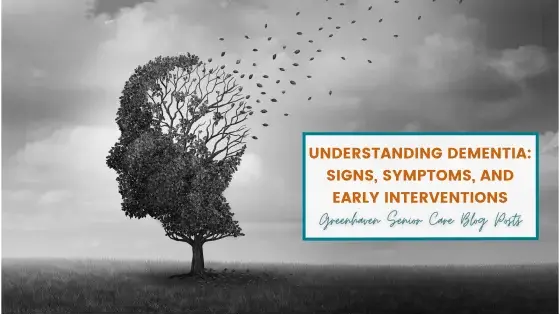
AI Companions for Seniors: A Thoughtful Guide for Families and Caregivers
AI companions for seniors explained by Greehaven Senior Care: what they are, how they help, and what families should consider before choosing one.
Call (206) 801-7555 Or Contact Us for Room Availability, Pricing, or if you are a family member or friend of our residents.

Dementia is a complex condition that affects millions of people worldwide, particularly older adults. Understanding its early indicators and the importance of early care planning can significantly improve the quality of life for those diagnosed. In this comprehensive post, we will explore the basics of dementia, its common signs and symptoms, and the vital role of early interventions and care planning. Whether you are a caregiver, a family member, or someone interested in senior care, this guide aims to provide valuable insights and actionable steps to navigate the challenges associated with dementia.
Dementia is an umbrella term used to describe a range of symptoms associated with a decline in cognitive function severe enough to interfere with daily life. It is not a single disease but rather a syndrome that can be caused by various conditions, including Alzheimer’s disease, vascular dementia, Lewy body dementia, and frontotemporal dementia.
Understanding these fundamentals is crucial for early detection and management. Early diagnosis, though it may seem daunting, opens the door to treatments and lifestyle adjustments that can slow progression and improve overall well-being.
Early recognition of dementia symptoms is essential for timely intervention. Often, the early stages of dementia can be subtle and may be mistaken for typical signs of aging. However, certain signs should prompt further evaluation.
These signs, when observed consistently, warrant a thorough evaluation by healthcare professionals. Early identification can facilitate planning and the implementation of strategies to manage symptoms more effectively.
Once the early signs of dementia are recognized, early intervention becomes paramount. The benefits of early intervention extend far beyond simply managing symptoms; they also enhance the overall quality of life for patients and their families.
The emphasis on early care planning cannot be overstated. By proactively addressing the potential challenges associated with dementia, families can ensure that their loved ones receive the best possible care tailored to their evolving needs.
Effective early care planning involves a multi-faceted approach that addresses both the medical and emotional needs of the individual. Here are some actionable strategies:
Family members and caregivers are indispensable in managing dementia effectively. Their involvement and support are critical in ensuring the patient’s comfort and quality of life.
Advancements in research and technology are paving the way for innovative approaches to dementia care. While these innovations are still emerging, they offer hope for improved diagnosis, treatment, and overall management.
These emerging trends offer a glimpse of hope. They underscore the importance of continued research and investment in dementia care, ensuring that patients and their families receive the best possible support.
If you suspect that you or a loved one may be experiencing early signs of dementia, the first step is to seek professional advice. Early intervention can make a significant difference in the course of the disease.
Taking these proactive steps can not only slow the progression of dementia but also help maintain a higher quality of life for those affected.
Understanding dementia—from its early signs and symptoms to the importance of early interventions—empowers patients, families, and caregivers to take control of the situation. By recognizing early indicators and acting promptly, you can pave the way for better management of the condition and ensure that your loved ones receive the compassionate care they deserve.
Early intervention is more than just a medical necessity; it is a holistic approach that incorporates physical health, emotional well-being, and practical planning. By prioritizing early care planning, families can navigate the complexities of dementia with greater confidence and support.
At Greehaven Senior Care, we believe in the power of early intervention and comprehensive care planning. Our commitment to senior care means that we provide resources, support, and specialized programs designed to enhance the quality of life for individuals with dementia. With the right care and proactive planning, it is possible to face the challenges of dementia head-on, ensuring that patients and their families can focus on what truly matters: living life with dignity and compassion.
Remember, early detection is key. If you notice any signs of cognitive decline or memory loss, do not hesitate to seek professional advice. Together, we can build a future where dementia is managed more effectively, and everyone affected receives the care and support they need.

AI companions for seniors explained by Greehaven Senior Care: what they are, how they help, and what families should consider before choosing one.

Dementia is a challenging condition for both individuals and their families. Learn about dementia, its impact, and why Greenhaven Senior Care in Edmonds is the best choice for compassionate and personalized dementia care

Discover the best senior-friendly activities in Edmonds, WA! From scenic waterfront strolls and cultural events to top dining spots like Arnies and Epulo Bistro, explore engaging ways to stay active and social. Whether you enjoy art classes, farmers markets, or a relaxing ferry ride, Edmonds offers something for everyone. Read on for our top recommendations!

Call (206) 259-5157 Or Contact Us for Room Availability, Pricing, or if you are a family member or friend of our residents.As the golden years approach,
You have successfully joined our subscriber list.